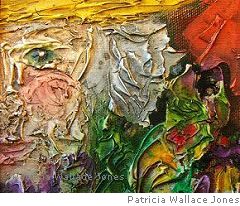David. W. Landrum
Italians
 Joe Sapharto’s fruit stand nestled by Joe Sapharto’s fruit stand nestled by
the railroad tracks, where Nickel Plate and
Grand Trunk ran. Suspenders holding up
his baggy pants, he cried, Grapes! Grapes!
Wonderful grapes! to passers-by,
winked at my girlfriend and me as we
walked to her house on Delphos street.
Mrs. Bruno, next door, old and bent,
hardly spoke English, tended her single
arbor trellis, chased us with a broom
when we stole its fruit. Her son, Tony,
ran a restaurant my family ate at now and then.
Joe Rocheo owned the city dump and a row
of slum houses close to my school. My teacher
called them Rocheo’s mansions. I’d see him
in his dump when I went there to shoot rats
with my bb gun. He walked around the piles
of burning trash—the devil out inspecting hell,
but he never spoke and never shooed me off.
Pulumbos ran a grocery store. I’d walk
four blocks to buy their comic books.
Drago’s Tilt-O-Whirl and Ferris Wheel,
disassembled by the cabbage fields in
the off-season, collected rust and snow.
They had come from the oldest land
to my Midwest city and
its near-by black-soil farms,
to swirling winters, breaking cold, to where
no Lombardy poplars, no oleanders
decorated the countryside, no mountains,
sea a thousand miles away,
jobs no one wanted, home a memory
of language, family, food,
the new ways creeping in, the old going,
gone in their children, one generation
enough to wash them to the sameness all around.
Near the alley close to my back yard
an old man grew huge heads of purple garlic
behind his shabby house. He harvested
wearing his jacket and floppy beret,
in the long cold spring, amid the maple trees.
La Source du Lyson
(composition by French guitarist,
Napoleon Coste, 1806–1883)
Those days embedded all
in the elaborate, the indirect,
so one approached
a meal, a glass of wine,
a lover’s grace, down a path
that ran through garden-mazes,
labyrinths of flowers,
multiple reception halls
with mirrors and fountains,
many doors, innumerable balconies.
Coste’s theme comes briefly,
three times, after an introduction,
flourishes, frames, harmonics,
the rondaeu villangeios, finale
un poco più lento but risoluto in
the final measures. His guitar,
leaps from phrase to phrase
like a bird from branch to branch,
wanders through quires of notes,
through a herd of variations that delay
the final melody.
The cascade of notes
startles the senses,
pleases the ear, the mind,
flatters the aesthetics of the heart.
Its circumspection puzzles us.
Like the scenic river that gives it
title, it meanders, strategy lodged
in the recoveries of an age
past revolution, past the cutting down
of youth by war, into the structured ambiance
that gave stability after
conflict’s long years.
Elaborate dress-ball, the guitar
with music mirroring coteries of form,
the cautionary protocols, approach
around convention like reflecting pools,
before Debussy and Fauré ventured
with just as decorous tread
into new contours, their music
like the weave of Monet’s colors,
Cezanne’s surfaces. Coste played.
The audience applauded;
through islands of approach
lovers and friends sought the essential
in a Paris of foggy nights,
repeated phrase, staged entrances.
David W. Landrum is professor of Humanities at Cornerstone University, Grand Rapids, Michigan. His poetry and short stories have been published in Web Del Sol, The Barefoot Muse, Driftwood Review, Small Brushes, and many other magazines and journals.
|
